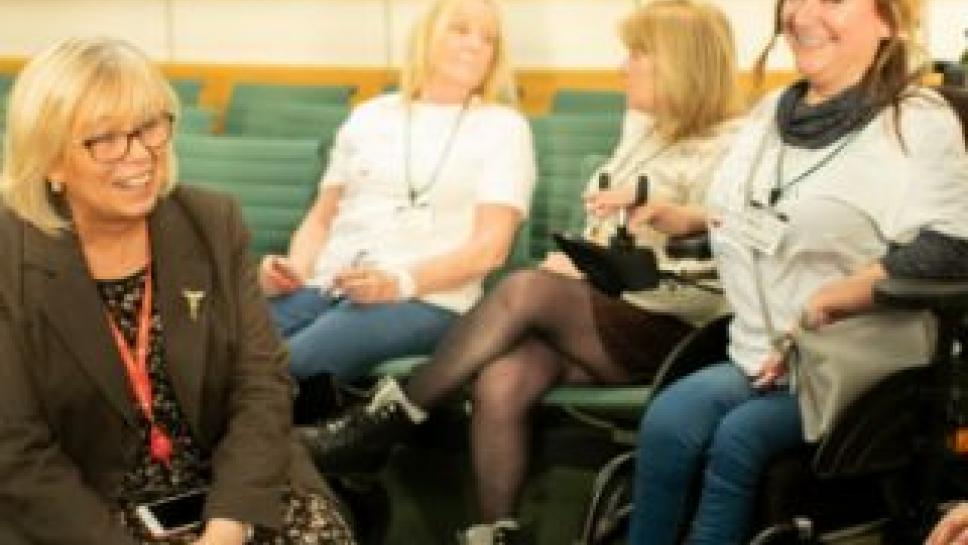
- Spinraza – the first treatment for the rare condition spinal muscular atrophy (SMA) – is clinically proven to potentially extend life and improve mobility
- The drug is set to be made available on the NHS for children and adults with SMA Types 1, 2 and 3
- Charities Muscular Dystrophy UK and Spinal Muscular Atrophy UK welcome the news, but reiterate that the appraisal process for rare disease drugs must be reformed
Children and adults with the devastating genetic condition spinal muscular atrophy (SMA) are facing a brighter future now that Spinraza, the first drug for the condition, is set to be approved for use in the NHS.
NHS England has announced it has come to an agreement with NICE and the drug’s manufacturer, Biogen, to make the treatment available for children, young people and adults with SMA Types 1, 2 and 3 through a scheme known as a Managed Access Agreement (MAA). This means that patients will be able to get Spinraza while more long-term data on its efficacy is gathered.
NICE had previously said in draft guidance, published last August that it was minded not to recommend the treatment.
Clinical trials have shown very positive results for Spinraza, with many babies with SMA Type 1 living longer. Without treatment, babies with this form of the condition are never able to roll over or crawl and without intervention for breathing difficulties are unlikely to live beyond the age of two. Those with other types of SMA may never learn to walk and may have difficulties with breathing and swallowing.
Catherine Woodhead, Chief Executive of Muscular Dystrophy UK, said:
“Today’s announcement is fantastic news that gives families hope. Children already receiving treatment are reaching milestones never thought possible and living longer, and now hundreds of others will be given that same chance.
“This would not have been possible without the support and hard work of clinicians, SMA charities, MPs and, above all, families and people with the condition. Thanks to all of us working together and our tireless campaigning, patients should face a brighter future.”
Spinraza was considered for use on the NHS through NICE’s Single Technology Appraisal (STA) route, which is generally used to assess drugs for more common conditions. It is only the second drug that has been appraised through this pathway to be approved for an MAA.
Muscular Dystrophy UK and Spinal Muscular Atrophy UK are now calling on NICE to formally recommend the treatment and for Biogen and NHS England to urgently implement the MAA so patients can access the drug quickly, and for Wales and Northern Ireland, which generally follows NICE’s guidance, to follow suit. The charities will also continue to push for changes to the appraisal process for rare disease drugs.
Catherine Woodhead added: “Every day counts for people with SMA, and we need to ensure this decision is implemented as soon as possible, and made available UK-wide. Our work here is not done. The lengthy, frustrating delays which we have seen throughout this process must not be allowed to happen again. During this time, there will have been irreversible decline in SMA patients’ health. The appraisal system for new treatments for rare diseases needs to be urgently overhauled to make it fit for purpose for future treatments for rare conditions.”
Doug Henderson, Managing Director of Spinal Muscular Atrophy UK, said:
“At last the SMA community has the answer it has been asking for since NICE started its appraisal almost 17 months ago. Our thanks to NICE, NHS England and Biogen for this great news and to all the SMA community who worked so hard on this journey. The clinical evidence was there; our voices were finally heard.
“We are only sorry that it took so long when time matters so much; for the families with infants with SMA Type 1 who have had no access to treatment since November 2018; for families and adults who have desperately wanted to have the opportunity to see what potential this treatment might have for them; for the clinicians who have been so frustrated by their lack of power to offer it.
“We will now do all we can to support the smooth implementation of the Managed Access Agreement. We will also continue to work to advocate for change to the NICE process for appraising access to orphan medicines so that future treatments are more rapidly and appropriately assessed.”
Rachel Jamieson’s four-year-old daughter, Matilda, has SMA Type 3. This form of the condition does not affect life expectancy, but leaves children less able to stand and walk over time. Rachel, from York, said:
“My heart breaks when my gorgeous, bubbly daughter Matilda asks me why she has wobbly legs, or whether her children will have SMA. Since starting school last year, Matilda has struggled more with her mobility. I believe that, if she had received Spinraza, she would not be having those difficulties.
“We are over the moon that our little girl and other SMA patients will be able to access Spinraza. It could give her more independence both now and as she grows older, which means everything to us. Now, we have hope for the future.”
ENDS
For more information about the work of Muscular Dystrophy UK, please contact Laura Burge, Senior Press Officer, on: 0207 803 2870 or l.burge@musculardystrophyuk.org
- Interviews and comments from families are available on request.

